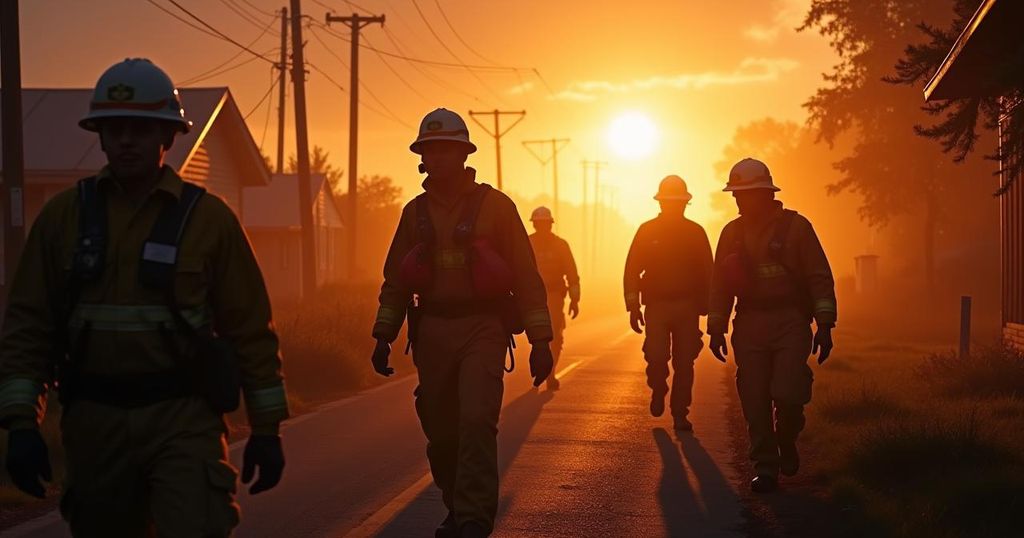Hurricane Helene’s Aftermath: Death Toll Rises to 100 as Rescues Continue in the Southeastern U.S.
Hurricane Helene has resulted in at least 100 deaths across the southeastern United States, particularly affecting Florida, Georgia, North Carolina, South Carolina, and Tennessee. President Biden has pledged continued federal support while candidates Trump and Harris prepare to visit impacted areas amidst ongoing rescue efforts. Severe flooding and infrastructural damage preoccupy local authorities and emphasize the need for enhanced emergency preparedness as climate change continues to influence storm severity.
The aftermath of Hurricane Helene has left a devastating impact across several southeastern states of the United States, with a death toll that has tragically risen to at least 100. The regions most severely affected include Florida, Georgia, North Carolina, South Carolina, and Tennessee, where rescue and recovery operations are ongoing. President Joe Biden characterized the crisis as “stunning” and committed to providing extensive federal assistance, including provisions for food, water, and vital rescue equipment. He highlighted the potential need to request additional funding from Congress to support recovery efforts and announced his forthcoming visit to North Carolina, particularly to assist in hard-hit areas. The storm, which initially made landfall as a Category Four hurricane with winds of up to 225 kilometers per hour (140 miles per hour), wreaked havoc across a path extending over 804 kilometers (500 miles) as it weakened while moving inland. Flooding and heavy rainfall resulted in significant infrastructural damage, closing roads and isolating communities. Notably, North Carolina reported 39 fatalities, followed by 25 in South Carolina, and others across the affected regions. Local officials, such as North Carolina Governor Roy Cooper, emphasized the unprecedented nature of the storm, stating, “This is an unprecedented storm. We’re working to surge supplies in. The emotional and physical toll here is indescribable.” Such conditions have left nearly two million households and businesses without power. Amidst these challenges, the storm has emerged as a pivotal issue in the upcoming presidential election, with both candidates, President Donald Trump and Vice President Kamala Harris, planning visits to the affected areas to assess damages and offer support. These efforts serve not only to address the immediate needs of those affected but also reflect the broader implications of climate change, as experts warn that warmer ocean temperatures are leading to increasingly severe Atlantic storms. The urgency and gravity of the situation demand swift federal action and community resilience to aid in recovery and rebuilding efforts.
Hurricane Helene, which struck the southeastern United States, has had extraordinarily harmful effects, particularly in states like Florida and North Carolina. As communities grapple with the legacy of severe flooding and infrastructural damage, local and federal government responses aim to coordinate rescue efforts and restore essential services. The event serves as a stark reminder of the impact of climate change on weather patterns, with increasing warnings from experts about the frequency and intensity of storms due to warmer sea conditions. Furthermore, the timing of Helene’s landfall necessitates immediate political responses, as both major parties view the disaster through the lens of the upcoming presidential election.
In summary, Hurricane Helene has caused catastrophic damage across several southeastern states, with a climbing death toll and widespread destruction necessitating extensive federal and local recovery efforts. Both the Biden administration and former President Trump, alongside Vice President Harris, are confronted with the urgent need to address the needs of vulnerable communities while reflecting on the larger issues of climate change and storm preparedness. As rescue operations continue, the focus remains on restoring power, rebuilding infrastructure, and supporting affected residents in their time of need.
Original Source: www.aljazeera.com




Post Comment